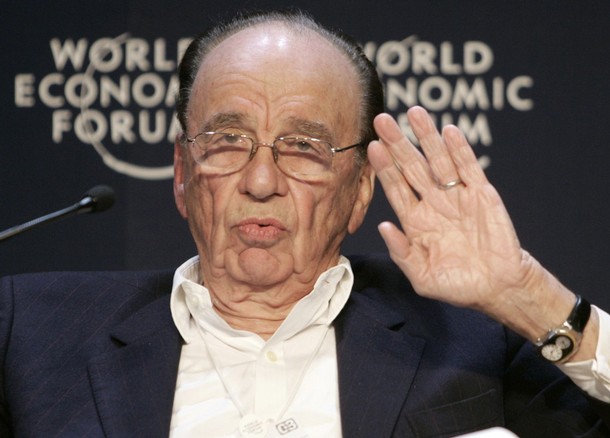
Rupert Murdoch. Photo (cc) 2015 by the Hudson Institute.
Previously published at WGBHNews.org.
The stench of corruption emanating from the White House is so noxious that it can be hard to focus on outrages that truly matter. This matters: As long rumored, but not confirmed until this week, President Trump personally intervened in the merger of media giants AT&T and Time Warner in order to punish CNN, high on the list of “fake news” outlets with which he is perpetually enraged.
The revelation is contained within Jane Mayer’s 11,500-word examination of Fox News, which appears in the current issue of The New Yorker. As Mayer describes it (and as even the most casual viewer will attest), over the past few years Fox has metamorphosed from a right-wing news operation with a shaky grasp of the truth into something much more dangerous: a propaganda outlet for Trump that serves up steaming piles of misinformation, disinformation, and conspiracy theories to its angry, fearful audience.
Not coincidentally, Fox News’ founder and guiding light, the international media magnate Rupert Murdoch, has emerged as one of Trump’s closest confidants. And Murdoch did not want to see two of his rivals merge, especially given that he had tried and failed to buy Time Warner himself just a few years earlier. Luckily for him, his business interests dovetailed with Trump’s hatred of CNN, one of Time Warner’s crown jewels.
As Mayer describes it, in the summer of 2017 Trump told his chief economic adviser, Gary Cohn, that the Justice Department should fight the merger. Citing “a well-informed source,” Mayer reports that Trump demanded action during a meeting with Cohn and his then-new chief of staff, John Kelly. “I’ve been telling Cohn to get this lawsuit filed and nothing’s happened!” she quotes Trump as saying. “I’ve mentioned it 50 times. And nothing’s happened. I want to make sure it’s filed. I want that deal blocked!” As the meeting was coming to a close, Mayer writes, Cohn told Kelly, “Don’t you f—ing dare call the Justice Department. We are not going to do business that way.”
But the Justice Department did indeed fight the merger, all the while denying any political motivations. Trump’s opposition to the merger, though, has long been thought to be driven by his hatred for CNN. Cohn himself believed it, according to Mayer. And as I argued a year and a half ago, blocking the merger could have resulted in Time Warner’s falling into Murdoch’s hands, thus fulfilling Rupe’s ambitions and giving him an opportunity to Foxify CNN. (Not that CNN isn’t in serious need of fixing, but that’s a topic for another day.)
Adding to suspicions that Trump was acting on his wish for retribution rather than by genuine concerns about the social consequences of such massive mergers was that there really didn’t seem to be much of a legal case against it. The AT&T-Time Warner deal is something we all ought to be wary of. But under current theories of antitrust law, there was little reason to block it. In fact, the Justice Department’s efforts to stop it were shot down by the courts at every step along the way, and it recently got the final go-ahead.
As Jordan Crook and Danny Crichton explain at TechCrunch, the two companies are complementary businesses rather than competitors. Time Warner is mainly a content company; AT&T is a distributor. Their combination is regarded by many economists as a “vertical merger” that could actually benefit consumers, Crook and Crichton write, by giving them “access to a more comprehensive set of services, at a lower price, while still generating profits.” Besides, in a world in which the entire media landscape is now dominated by Google and Facebook, it may be that the only way to provide competition is by supercharging other media companies.
Now I’ll grant you that in my perfect media world, I would not only have ruled against the merger of AT&T and Time Warner but I’d break up Google and Facebook as well. But it’s the world of the corporate titans, and we’re just living in it. Given that, there is every reason to oppose governmental intervention motivated by presidential pique rather than by genuine regulatory concerns.
Mayer’s report appears destined to become part of the bill of particulars that the Democratic House is assembling as it investigates Trump’s corruption and possible crimes. U.S. Rep. Adam Schiff, chair of the House Intelligence Committee, said that he has “long feared Trump would use the instruments of state power to carry out his vendetta against the press he has attacked as the ‘enemy of the people.’”
Meanwhile, another media company seeking favors from the White House is playing it safe. According to David Fahrenthold and Jonathan O’Connell of The Washington Post, the cell-phone company T-Mobile, which is seeking to merge with its rival Sprint, has spent $195,000 at Trump’s Washington hotel since announcing the proposed deal nearly a year ago — far in excess of what the company had ever spent there previously.





